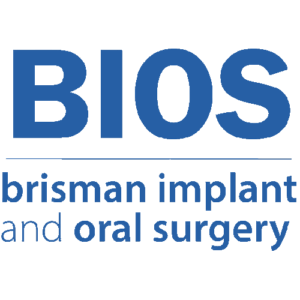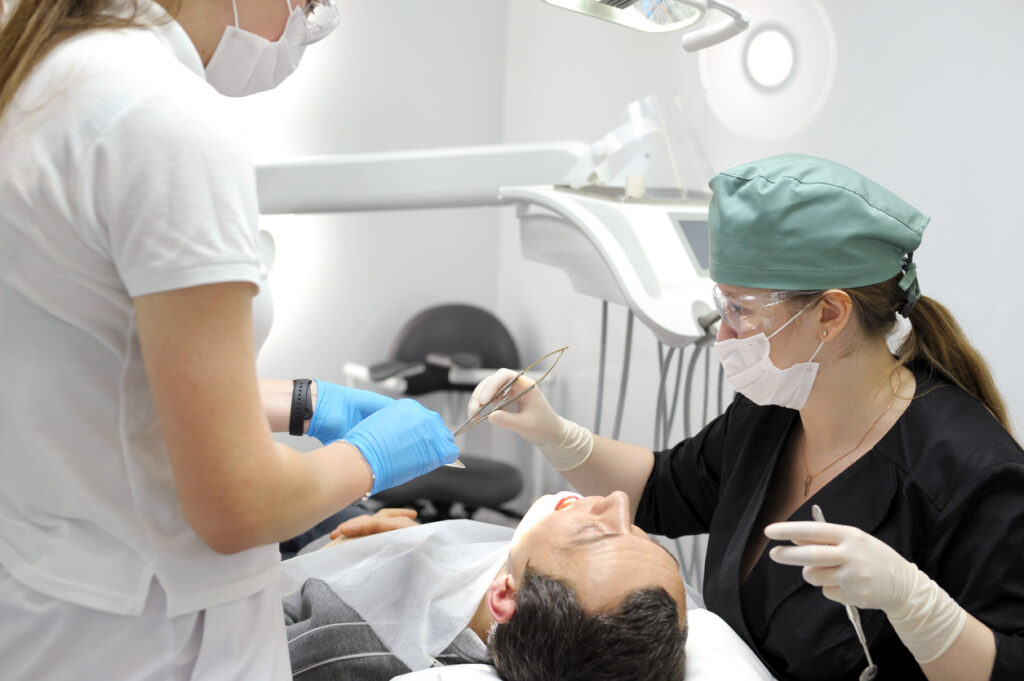Undergoing oral surgery is a significant step in boosting your oral health, whether it’s a tooth extraction or wisdom tooth removal. What you do afterward is key to your recovery journey. Avoiding tobacco products like cigarettes and smokeless tobacco is essential, as smoking has been linked to increased gum disease, loose teeth, and tooth removal, according to a study on U.S. adults.
This article will discuss how smoking can throw a wrench in your healing process and when it might be safe to light up again. Taking proactive steps now can smooth your recovery and help you maintain a healthy smile long-term.
What Is Oral Surgery?
Oral surgery includes procedures that address issues in the teeth, gums, and jaws, such as wisdom tooth extractions, wisdom teeth removal, and dental implants. These procedures often require skilled manipulation of bones and soft tissues, underscoring the importance of a careful recovery process guided by experienced oral surgeons. Understanding these aspects helps you appreciate the post-operative care needed for a successful outcome.
What to Expect During Recovery
Understanding the recovery process can help ease your experience following oral surgery. Here’s a more detailed overview of what to anticipate:
Initial Pain and Swelling
Some discomfort and swelling are common during the first few days. Your oral surgeon will likely suggest pain relief methods or prescribe medication. Additionally, applying cold compresses to the affected area can reduce swelling and provide soothing relief.
Bleeding
It’s normal to experience light bleeding shortly after the procedure. To manage this, use gauze pads as instructed, applying gentle pressure to encourage clot formation. Avoid activities like using straws or spitting, which might dislodge the blood clot and lead to complications such as dry sockets.
Oral Hygiene
Maintaining oral cleanliness is essential for preventing infections and promoting healing. Gently rinse with prescribed mouth solutions and avoid direct contact with the surgical site. Caring for the rest of your mouth by brushing and flossing helps keep bacteria at bay.
Dietary Modifications
Start with soft foods like yogurt, applesauce, and broth to minimize irritation to the surgical area. As healing progresses, gradually reintroduce regular foods, all according to your oral care provider’s guidance.
Follow-up Appointments
Schedule regular visits with your oral surgeon to track your recovery progress. These appointments allow your healthcare provider to adjust treatment as necessary and ensure any arising issues are promptly addressed.
Habits to Avoid
Refrain from smoking or using tobacco products, as they can hinder healing and increase the risk of infections. Additionally, avoid alcohol consumption and strenuous activities, which can affect recovery. Creating a calm environment and resting adequately will support the healing process.
Signs of Complications and When to Seek Help
Be vigilant for these signs indicating a need for professional evaluation:
- Excessive Pain. Persistent, intense pain requires urgent attention, as it may signal complications that need medical assessment.
- Persistent Bleeding. Contact your healthcare provider if bleeding extends beyond the initial recovery phase despite proper care.
- Swelling or Infection. Indicators of infection, such as increasing swelling or fever, should be addressed by your oral care specialist.
- Bad Breath. Consistent bad breath can suggest improper healing or infection, necessitating further examination by a professional.
When Can You Smoke After Oral Surgery?
After oral surgery, abstaining from smoking is recommended for at least 72 hours, allowing for the formation of a stable blood clot and reducing the risk of complications. Extended abstinence aids the healing period, promoting faster recovery and reducing harmful effects. Consult with your oral surgeon, who can provide advice tailored to your specific case.
What Happens If You Smoke After Oral Surgery?
Smoking after oral surgery can significantly complicate your recovery and overall oral health. Here’s a closer look at the risks involved:
Disruption of Blood Clot
One of the primary concerns with smoking post-surgery is the disruption of the protective blood clot that forms at the surgical site. This clot is essential for healing. Smoking dissolves or dislodges it, leading to dry sockets, which are painful conditions that delay the healing process and cause significant discomfort.
Delayed Healing
The chemical toxins in tobacco products restrict blood flow, which is vital for delivering nutrients and oxygen to healing tissues. This disruption slows down the natural healing process, prolonging recovery time and increasing the likelihood of encountering additional complications.
Increased Risk of Complications
Smoking can heighten the risk of developing painful complications like alveolar osteitis. This occurs due to impaired healing and can lead to severe discomfort and infection, necessitating further medical intervention and treatment adjustments.
Severe Pain and Infection
Smokers are often at a greater risk of experiencing more intense pain and a higher risk of infection than non-smokers. The presence of harmful chemicals in tobacco products weakens the body’s immune response, complicating the recovery process and leading to extended periods of recovery.
Long-term Oral Health Concerns
Continual smoking not only complicates immediate recovery but also contributes to chronic oral health issues. These can include persistent bad breath, gum disease, loose teeth, and an overall deterioration of oral health, which can affect the appearance and functionality of your teeth over time.
Why You Should Stop Smoking After Tooth Extraction
Quitting smoking after tooth extraction can offer numerous health advantages, contributing significantly to both immediate recovery and long-term well-being. Here’s how stopping smoking can benefit you:
Enhanced Wound Healing
Avoiding smoking reduces the introduction of harmful chemicals to the surgical site, allowing for more efficient and quicker recovery. Without the interference of tobacco toxins, wound healing is less likely to face obstacles, reducing the risk of healing delays and enhancing the overall recovery experience.
Lower Risk of Complications
By stopping smoking, you minimize the chances of developing conditions such as dry sockets and alveolar osteitis, which are common complications after extractions impacted by smoking. A smoke-free post-operative period significantly lowers these risks, supporting a smoother and less painful healing journey.
Improved Oral Health
Quitting smoking leads to better oral hygiene, which plays a critical role in preventing infections and promoting the health of your gums and teeth. Without the negative effects of smoking, you reduce the risk of issues like gum disease and tooth decay, helping maintain a healthier oral environment.
Overall Health Improvements
Embracing a smoke-free lifestyle offers widespread health benefits beyond oral health. It contributes positively to cardiovascular health, reduces the risk of various cancers, and enhances the overall quality of life. These improvements not only help with immediate recovery but also support long-term health and well-being.
Tips on How to Quit Smoking After Tooth Extraction
Successfully quitting smoking after a tooth extraction can significantly enhance your recovery and overall health. Here are some practical strategies to support your journey towards a smoke-free life:
Nicotine Replacement Therapies
Consider using nicotine patches, nicotine gum, or lozenges to curb cravings while reducing exposure to harmful chemicals that could interfere with healing tissues. These alternatives provide a controlled amount of nicotine, helping manage withdrawal symptoms while protecting your surgical site from direct harm.
Stress-Relief Techniques
Stress often triggers the urge to smoke, so adopting relaxation practices can be beneficial. Incorporate meditation, deep breathing exercises, or yoga into your routine to help reduce stress levels and manage cravings effectively, thus lowering your dependence on nicotine.
Seek Support
Joining a quit-smoking group or community can provide encouragement and accountability. Sharing experiences and challenges with others who are also trying to quit reinforces motivation and offers emotional support through the transition. Online forums or local support groups can be excellent resources.
Distraction Methods
Engage in activities that keep you busy and distracted from the urge to smoke. This could include hobbies, physical exercise, or creative pursuits such as painting or writing. Keeping your mind and body occupied can reduce the temptation to smoke and help build healthier habits.
Reimagine Your Oral Health: Expert Guidance Awaits You!
Your commitment to post-operative care and quitting smoking plays a significant role in your recovery and long-term oral health. At Brisman Implant and Oral Surgery, we’re here to support you every step of the way. Our expert oral surgeons are ready to collaborate on a personalized recovery plan tailored to your unique needs, aiming for the best possible outcome.
Book a consultation with us to develop a strategy that prioritizes your healing and enhances your oral health journey. Contact our office today and take the first step toward a brighter, healthier smile.


